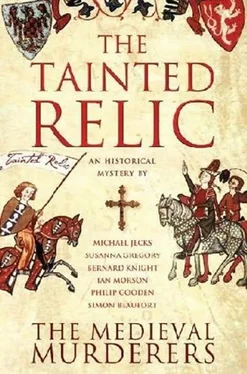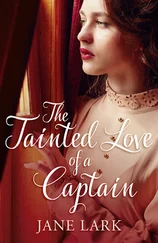‘I will ensure this reaches Rome,’ he said, slipping it back into the bag and placing the whole thing inside his scrip. ‘Pichard was greedy and corrupt, and would have sold it to the first unscrupulous relic dealer who offered him a bargain, but I am not subject to such weaknesses.’
‘Be sure you are not,’ warned Marcus, sinking to his knees as a curious lethargy came over him. The relic was about to claim its third victim, and he knew that unless Julius could take it to Rome and ensure it rested in the Vatican’s deepest vaults with the bones of holy men, then more would follow. Barzak’s curse was to be taken seriously, and Peter had been right to organize its removal from the city. He had simply chosen the wrong man, and it was fortunate that Julius was on hand to advise and help. ‘Leave now.’
‘I am already gone,’ said Julius, taking up his travelling pack and heading for the door. ‘Finish the wine I brought before you go to tell your brethren of our success. It will fortify you, and you are looking pale.’
Julius took the proffered cup and drained its contents. By the time he had finished, Julius had slipped out of the door and closed it behind him. Marcus was rather startled to hear the sound of a key in the lock. He pulled himself to his feet and staggered towards it, pulling ineffectually until he realized that it would not open. He wondered why Julius had done such a thing, when he had just instructed him to tell his brethren what he had done. He swayed uneasily, feeling dizzy and a little sick, and went to the table, where Julius’s goblet of wine stood untouched. And then he understood.
Julius had poisoned him, and had locked him inside this remote hovel so that no one in his Order would know what had been done. But why? Marcus had given Julius the relic in good faith and willingly. Why had it been deemed necessary to kill him? He slumped to the floor as his legs became rubbery and unable to hold his weight. The answer to that question was clear, too: it was not Pichard whose motives and character were questionable, but Julius’s. Julius intended to use the relic for his own ends.
Shadows clouded Marcus’s vision, and he could not feel his legs. Would he have died anyway, if Julius had not killed him? He had touched the relic-to make sure it was the right one when he had stolen it back from Pichard-and had resigned himself to his fate. But would it have happened? Barzak’s curse could have nothing to do with Julius’s decision to commit murder. Or could it? As he closed his eyes for the last time, Marcus wondered how many more people would die before the relic reached Rome. He smiled. Julius would be one of them, because he had laid his profane fingers on it. But how many more?
Then darkness claimed him.
Devonshire, 1194
The cargo boat glided up the last half-mile of the mirror-calm river, its single sail tightly furled, the flood tide being sufficient to drift it to its mooring against the quay. Short and stubby, the Mary and Child Jesus sat low in the water, her hold full of casks of wine from Anjou and kegs of dried fruit from Provence. The weather on the return voyage from St-Malo had been kind, unlike the outward trip, when the master had wondered whether he would ever reach harbour alive, with his load of Devonshire wool and Exeter cloth. Thorgils the Boatman, who owned the vessel, as well as being its captain, swore that this was going to be the last trip of the season. November was really too late to be risking the long Channel crossing from the mouth of the Exe to Brittany. After they had discharged their cargo at Topsham, he would take the Mary back the few miles to Dawlish and haul her out on the beach for a refit, then spend the time until Easter in his fine new house with his young blonde wife. The thought warmed him in spite of the cold mist that hung over the river, though the ache in his joints told him that he was getting old-twenty years older than the delectable Hilda.
The boat rode sedately along on the tide and Thorgils leaned on the steering board to make sure that her bow would nudge against the quay at exactly the right spot. He glanced to port and saw the flat marshland stretching away to the low hills in the distance. If he were to look back a little, he would almost be able to see Dawlish, the better to imagine Hilda’s warm embrace.
Ahead was the river, which rapidly narrowed to reach Exeter five miles upstream. A few yards to starboard was the village of Topsham, with its welcoming alehouses and brothels, though he had no need of the latter.
The master looked down into the well of the boat, where his crew of six were assembling along the bulwark to sing the traditional hymn of thanksgiving to the Holy Virgin for deliverance from the perils of the sea, this time joined by their solitary passenger.
This Robert Blundus was a strange fellow, mused Thorgils, as the singing reached its crescendo when the blunt prow of the Mary nudged the quay. He had arrived at the last moment, just before they sailed from St-Malo. The shipmaster had noticed that Blundus kept looking over his shoulder at the bustling throng on the quay-side and seemed relieved when a widening gap began to appear between the ship and the shore. Thorgils suspected that he was either a fugitive from the law or had unpleasant acquaintances who were hunting him down. But it was none of his business, and the coins of mixed English and French silver that Blundus offered as his passage money were genuine enough for the master to accept him aboard without any questions.
The stem-post bumped against the wharf and willing hands ashore lashed a bow-rope around one of the tree stumps buried along the quay-side. Thorgils let the incoming tide push the stern of the Mary right around in a half-circle, so that the port side came to rest against the rough stone wall, the steering board left safely out on the starboard side. As the stern ropes were thrown ashore, the passenger moved to stand impatiently at the gap in the bulwarks where the landing plank would be pushed through. His large pack was already strapped to his shoulders, and Thorgils assumed that he was a chapman, one who hawked goods such as thread, needles and ribbons, around towns and villages. It was unusual, though not unknown, for one to cross the Channel in pursuit of such trade, and the shipmaster wondered whether he had family in Brittany.
The moment the gangplank was slid ashore, the traveller hurried down it with only a perfunctory wave of farewell to the crew. The quay-side of Topsham was a short length of stone wall, with muddy banks stretching away on either side. Ships could ride upright at high tide to discharge their cargo, but the rest of the time they lay canted over on the thick mud that extended for miles down to the sea at Exmouth.
Robert Blundus had never been here before, and he surveyed the little port with some disdain, being more used to large harbours such as Southampton or King Richard’s new creation at Portsmouth. He saw a line of buildings straggling down the east bank of the river, ending in huts and sheds on the quay. A church tower in new stone rose above the centre of the long main street, and where there was a church, there was always an inn or two.
This turned his mind to the need for a meal and a bed for the night, as the short November day was coming to a close. He humped the heavy pack higher on his shoulders and set off through the cold mud of the wharf towards the high street. An icy east wind made his cheeks tingle and reminded him that he had left the warmer climes of France far behind. At least his ears were warm, as he wore a woollen cap pulled down over his forehead and neck, the pointed top flopping over to one side. His leather jerkin was bulky, belted over a pair of thick serge breeches, cross-gartered above wooden-soled clogs. As he strode purposefully towards the village, a dew-drop formed on the end of his fleshy nose and his rather prominent blue eyes watered as they scanned the motley collection of buildings. Some were stone, but the majority were either wood or cob, a mixture of mud and straw plastered over a wooden frame, with roofs of reeded thatch.
Читать дальше












